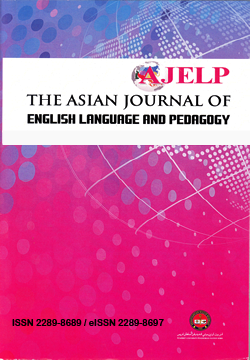Virtual Learning Among ESL Teachers in Malaysian secondary schools during COVID-19
DOI:
https://doi.org/10.37134/ajelp.vol11.2.8.2023Keywords:
COVID-19, perceptions, virtual learningAbstract
This study aimed at investigating challenges and perceptions of virtual learning among ESL teachers in secondary schools during the pandemic, COVID-19. A quantitative research method was used that used a survey for data collection. The instrument involved was a questionnaire created using Google Forms and distributed via social media. The sample was selected randomly and comprised 50 secondary school English language teachers in Malaysia. A descriptive analysis was carried out using SPSS software 2.5 to find the overall level of agreement in terms of frequencies and percentages. The findings showed a positive indication of English language teachers’ challenges and perceptions of online teaching, whereby they managed to overcome the technical issues and improved time management in teaching virtually. However, there were a few problems that needed to be addressed, especially pertaining to equitable network coverage. The authorities need to provide ample support for technological innovations to assist both teachers and learners in achieving meaningful online teaching and learning. This study inspires future research to explore the challenges of online teaching and learning in the Malaysian education system. This could help schools, teachers, and the community work for improvement to optimise the outcomes of online learning in the future.
Downloads
References
Anagün, Ş. S. (2018). Teachers ’ Perceptions about the Relationship between 21st Century Skills and Managing Constructivist Learning Environments. 11(4), 825–840
Anwar, M. A. (2020). Online Learning amid the COVID-19 pandemic: Students' perspectives. Journal of Pedagogical, Sociology and Psychology, 45-51.
Auma, O. M., & Achieng, O. J. Perception of Teachers on Effectiveness of Online Learning in the wake of COVID-19 Pandemic.
AJELP: Asian Journal of English Language and Pedagogy, 9(1), 16-27. https://doi.org/10.37134/ajelp.vol9.1.2.2021
Baig, M. A. (2011). A critical study of effectiveness of online learning on students' achievement. Manager's Journal of Educational Technology, 28-34
Bao, W. (2020). COVID ‐19 and online teaching in higher education: A case study of Peking University . Human Behavior and Emerging Technologies, 2(2), 113–115. https://doi.org/10.1002/hbe2.19
Basilaia, G., & Kvavadze, D. (2020). Transition to Online Education in Schools during a SARS-CoV-2 Coronavirus (COVID-19) Pandemic in Georgia. Pedagogical Research, 5(4). https://doi.org/10.29333/pr/7937
Creswell, J. W., & Creswell, J. D. (2018). Research design: qualitative, quantitative, and mixed methoods approaches (5ht ed. ). Los Angeles: SAGE Publications, Inc
Coiro, J., Knobel, M., Lankshear, C., & Leu, D. J. (2008). Central issues in new literacies and new literacies research. Handbook of research on new literacies, 1-21.
Daniel, S. J. (2020). Education and the COVID-19 pandemic. Prospects, 0123456789. https://doi.org/10.1007/s11125-020-09464-3
Doghonadze, N., Aliyev, A., Halawachy, H., Knodel, L., & Adedoyin, A. S. (2020). The Degree of Readiness to Total Distance Learning in the Face of COVID-19 Teachers’ View (Case of Azerbaijan, Georgia, Iraq, Nigeria, UK and Ukraine). Journal of Education in Black Sea Region, 5(2), 2–41. https://doi.org/10.31578/jebs.v5i2.197
Kaid Mohammed Ali, Jamal and Rashad Ali Bin-Hady, Wagdi, (2019). A Study of EFL Students’ Attitudes, Motivation and Anxiety towards WhatsApp as a Language Learning Tool Arab World English Journal (AWEJ) Special Issue on CALL Number 5. July 2019. http://dx.doi.org/10.2139/ssrn.3431782
Kumar, J. A., Bervell, B., & Osman, S. (2020). Google classroom: insights from Malaysian higher education students’ and instructors’ experiences. Education and Information Technologies. https://doi.org/10.1007/s10639-020-10163-x
Madaki, A., Moses, S.K., Yaya, F.B. (2020) "COVID 19 and e-learning in secondary schools in Nigeria" JEAPP Online Journal: Vol. 1: Issue 1, Article 017.
Mahyoob, M. (2020). Challenges of e-Learning during the COVID-19 Pandemic Experienced by EFL Learners. Arab World English Journal (AWEJ), 11(4)
Martin, F., Budhrani, K., & Wang, C. (2019). Examining faculty perception of their readiness to teach online. Online Learning Journal, 23(3), 97–119. https://doi.org/10.24059/olj.v23i3.1555
Norezan Ibrahim, Siti Fairuz Dalim, Rosilawati Sueb & Azzlina Adzra'ai. (2019). Trainee Teachers’ Readiness Towards 21St Century Teaching Practices. 15. 110-120.
Sepulveda-Escobar, P., & Morrison, A. (2020). Online teaching placement during the COVID-19 pandemic in Chile: challenges and opportunities. European Journal of Teacher Education, 43(4), 587-607.
Shivangi, D. (2020). Online Learning: A Panacea in the time of COVID - 19 Crisis. Journal of Educational Technology, 5-22.
T. Muthuprasad, & Jha: G. K. (2020). Students' Perception and Preference for Online Education in India during COVID-19 pandemic. Social Sciences and Humanities Open, 38.
Voogt, J., Erstad, O., Dede, C., & Mishra, P. (2013). Challenges to learning and schooling in the digital networked world of the 21st century. Journal of Computer Assisted Learning, 29(5), 403–413. https://doi.org/10.1111/jcal.12029
Yen, E. L. Y., & Mohamad, M. (2020). Utilising E-Learning to Assist Primary School ESL Pupils in Learning to Spell during COVID-19 Pandemic: A Literature Review. Creative Education, 11(8), 1223-1230.
Downloads
Published
Issue
Section
License
Copyright (c) 2023 Kaliamma Kasthuri Balakrishnan, Revathi Gopal, Ahmed Abdullah Al-Sakkaf

This work is licensed under a Creative Commons Attribution-NonCommercial-ShareAlike 4.0 International License.





